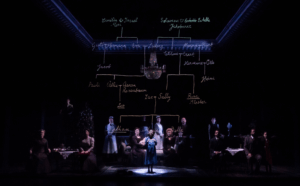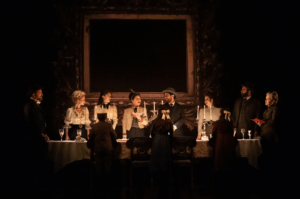West Wing Star, Joshua Malina, In Leopoldstadt’s Role of A Lifetime: Exclusive Interview
Josh Malina has garnered fame from roles on The West Wing, Scandal, Sports Night and The Big Bang Theory. He also was in the Broadway production of Aaron Sorkin’s A Few Good Men. Now, he’s back on Broadway, playing Hermann Merz in the breathtaking Leopoldstadt, by playwright Tom Stoppard.
 It is a dream come true for him both as an actor and a Jew. Watching a Stoppard play at seventeen is what inspired Malina to go into acting. But when Malina realized how deeply and substantively Jewish Leopoldstadt is, he knew that this was a role of a lifetime.
It is a dream come true for him both as an actor and a Jew. Watching a Stoppard play at seventeen is what inspired Malina to go into acting. But when Malina realized how deeply and substantively Jewish Leopoldstadt is, he knew that this was a role of a lifetime.
We recently sat down with Malina to learn more about his Jewish background, why this play is so important to him, and how we can all combat rising Jew hatred. For those that aren’t familiar, Leopoldstadt follows one extended Jewish family from pre-war Austria in 1899 all the way to the 1950s post-Holocaust. It is based on Stoppard’s own family, who mostly perished in Auschwitz, a fact that Stoppard didn’t know until he was in his 50’s, when a cousin contacted him to share his family’s history. Stoppard was raised Christian after the Holocaust, and his family was never discussed.
Malina’s character Hermann, actually converted from Judaism to Catholicism “because it’s the way to rise in Austrian society,” Malina shares. He explains that Hermann saw antisemitism around him and in his own lineage and decided to bury his own Judaism, marrying a Catholic woman and identifying as a non-Jew.
In fact, while this play is deeply Zionistic, Israel being one of the only hopes offered in it, Malina’s character, Hermann, finds  the Jewish state laughable. Hermann’s brother-in-law, Ludwig, gives Hermann copy of Theodore Herzl’s pamphlet on Israel. Malina explains that according to Hermann, “Austria has moved beyond that [antisemitism]…Ludwig has some very beautifully articulated arguments for why the Jewish people may want a place in the world. The argument and conversation is emotionally powerful.”
the Jewish state laughable. Hermann’s brother-in-law, Ludwig, gives Hermann copy of Theodore Herzl’s pamphlet on Israel. Malina explains that according to Hermann, “Austria has moved beyond that [antisemitism]…Ludwig has some very beautifully articulated arguments for why the Jewish people may want a place in the world. The argument and conversation is emotionally powerful.”
As the play moves forward, you see that Hermann is unable to ever get rid of that Jewish identity fully. Even in conversion he is still a Jew and still viewed as a Jew by others. “There is a great moment I love where my character has had some really bad news and he comes back to the Passover seder,” Malina explains. “He’s not too interested in religious observance and his nephew-in-law starts to sing the four questions. You don’t think Hermann will join but he just had a scene where he was told, ‘Whatever you think you are, you’re a Jew.’ [That feeling of being a Jew] may be deep down in him, but he still connects with it.”
Malina also notes that the play doesn’t just deal with gentiles hating Jews, it also touches on internalized antisemitism. Discussing where the family might spend next Passover, Malina’s character, Hermann, doesn’t want to do Passover in Galitzia because the Jews there are shtetl Jews. Hermann’s sister-in-law calls him a snob for feeling this way. Malina explains that dynamics of Jews judging other Jews for being embarrassingly “too Jewish” continue to this day.
–
 In real life, Malina’s Jewishness is at the forefront of who he is — he could not be further from Hermann. He grew up in New Rochelle, NY in a traditional Conservative family and went to Orthodox Day School until 8th grade since there were no Conservative ones in the area. Malina describes his Orthodox day school as “a beautiful place to go to school.” He adds, “I came from a home where my parents valued Jewish tradition and observance. They taught me to be proud of who I am and deeply ingrained my Jewish identity in me.” As one of the only Jewish celebrities who regularly speaks out publicly on antisemitism, Malina does not see these acts as brave but merely a reflection of his values.
In real life, Malina’s Jewishness is at the forefront of who he is — he could not be further from Hermann. He grew up in New Rochelle, NY in a traditional Conservative family and went to Orthodox Day School until 8th grade since there were no Conservative ones in the area. Malina describes his Orthodox day school as “a beautiful place to go to school.” He adds, “I came from a home where my parents valued Jewish tradition and observance. They taught me to be proud of who I am and deeply ingrained my Jewish identity in me.” As one of the only Jewish celebrities who regularly speaks out publicly on antisemitism, Malina does not see these acts as brave but merely a reflection of his values.
With the wave in the last several years of increased antisemitism in the U.S., he believes that we need to pay closer attention as Jews to what is going on and take action to stand up against it. “I’m trying to protect myself and others,” he explains. “A lot of people feel really comfortable expressing the hate and prejudice they feel.” Malina also acknowledges the complicated nature of how Jews are seen,“we are a minority not often viewed as a minority.”
“I feel a little bit that I grew up in a naive way myself, because ‘Never Again’ was inculcated into me, I had it pretty good as an American Jew because even though I said and believed Never Again, [antisemitism] didn’t feel like the moment of the present. In my later age, I learned that this stuff has been bubbling under the surface. The last four, five, six years in the U.S., it has come to the surface.”
By the end of the play, the story may make us question our own complacency. History can only be judged looking backwards. “It’s a very good time for this play to be produced,” Malina explains
In fighting antisemitism, it’s that self-confidence and pride in who you are that needs to come first. “If you are the kind of Jew who doesn’t feel comfortable being Jewish, learn and explore more and dig into the beauty of Judaism,” he shares. “There is a lot to savor and be proud of.”
Malina will star in Leopoldstadt through the end of its run on July 2. Make sure to get tickets to see the astounding performance before it’s too late.
If you found this content meaningful and want to help further our mission through our Keter, Makom, and Tikun branches, please consider becoming a Change Maker today.







